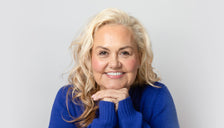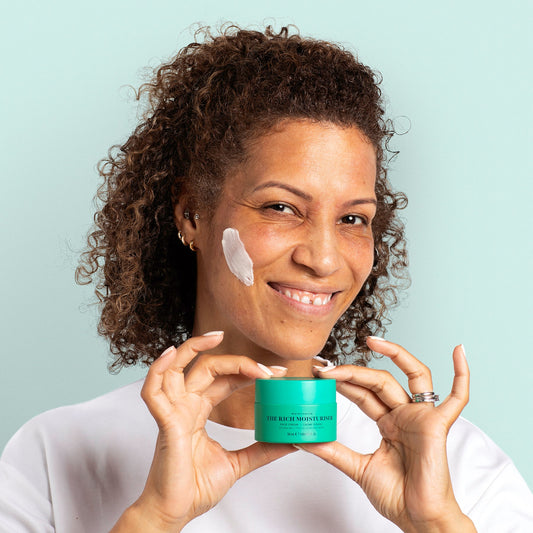
Hi All!
My book skincare is out on 30th April.
You can pre-order here: http://smarturl.it/skinCAREch
This Morning/Alanis.. https://youtu.be/LLXfDlqhBlA
Ian’s practice: http://www.ianmarber.com/
Things discussed in this video:
Allergies/intolerances
PCOS
Peri/menopause
Collagen (ingested)
Supplements
Bobbi Brown’s Evolution 18
Ian’s homework!
Menopause
This is such a potentially complex area that listing five foods that can help manage menopausal symptoms might be misleading as they can be so varied. That said, these are the 4 issues together with a suggestion of how to manage them;
- Hot flashes can occur when hormones change, and there is some evidence that omega 3 fats may be of benefit. The most effective forms of omega 3, called DHA and EPA, are found in marine foods such as oily fish, but another version, ALA, is found in walnuts, chia, seaweed, soy (including edamame beans) and hempseed and thus a viable alternative suitable for vegetarians and vegans. You may consider a supplement but remember that omega 3 can thin the blood so take appropriate advice before starting a course (for example vitamin E and aspirin have a similar effect).
- Oestrogen offers a degree of protection against osteoporosis and when levels tail off the risk of bone damage increases. Vitamin D, calcium and magnesium help support bone density;
Vitamin D is in oily fish, soy and mushrooms but you should probably take a supplement anyway.
Calcium is found in almonds, dairy, baked beans, watercress, spinach, sardines and pilchards, to name a few.
Magnesium is found in dark green vegetables, lentils, seeds and oats, again to name a few.
- Oestrogen also offers a degree of protection against cardiovascular disease, so much so that women generally are less affected by heart disease than men of the same age, but the risk equalises as hormones drop. Therefore, at menopause, my advice is to see a nutrition professional in person to get personal advice, as your nutritional needs change.
- There is a lot of talk about phytoestrogens, which are plant chemicals that have a weak oestrogen-like effect. These can be found in tea, soy, chickpeas and grapes as well as several other foods. You can take a supplement to help manage symptoms, but if you do then make sure you get good advice first, especially if you are taking HRT.
Vitamin C rich foods
We need around 300mg of vitamin C a day, but it's found in all fruits and vegetables to a degree, so as long as you get you 7 a day you should be getting 300mg plus.
The richest sources are cherries, blackcurrants, melon, citrus, sweet potato, peppers, kiwi and kale.
Supplements
My first piece of advice, and I cannot stress this enough, is get advice from a nutrition professional, not someone who sells them, either on their website or in a shop.
That said, the supplements that I think most adults should be taking, especially when we get a little older, are; Vitamin D Vitamin B12 Omega 3
The others to consider are;
Calcium
Magnesium
Selenium
Probiotics
But, get advice first. These aren’t benign substances, we want them to ‘do’ something, and as such getting professional guidance is a wise move.
Hair
In the video I (Ian) talked about nutrients that support the normal maintenance of hair. These are the nutrients that have been identified as being directly involved in hair growth and quality, and whilst there will be others, these nutrients have been fully researched with claims authorised by the European Food Safety Authority (EFSA). This is important as it shows that the claims are backed up by robust research.
Equally important is the wording of the claims which say that said nutrient “contributes to the normal maintenance of hair”. They don’t say that having more of whatever it is will do any more than maintain and support growth or quality. Having higher intake of X or Y may do nothing more than make you feel you are doing something, when in fact you might simply be wasting your time and money. Moreover, we can have too much, which, in the case of selenium for example, can, in time, result in gastrointestinal issues, hair loss, nerve damage and fatigue.
For this reason, I advise getting nutrients from food. If you think you need a supplement, look at your diet.
But what are the nutrients? There’s biotin, copper, selenium and zinc, and here are some foods in which you can find them;
Biotin – liver, fish, egg yolk, soy products, hazelnuts, almonds, Swiss chard, sweet potato, carrots and avocado.
Copper – shellfish, miso, offal, sesame and sunflower seeds, coconut milk, cashews, avocados, asparagus, chestnuts mushrooms, beans, soya beans and oats.
Selenium – Brazil nuts, cashews, sesame seeds, oats, barley, brown rice, chicken, skimmed milk, kidney beans, onions, button mushrooms, herring, halibut, cod, salmon, sole, mackerel, lobster, scallops and prawns.
Zinc – protein foods, so meat, poultry, game, liver, eggs, seafood, cheese, yoghurt, beans, nuts, seeds, oats, brown rice, sesame and pumpkin seeds.
As you can see, there are plenty of foods to choose from, but here is an example of a day’s eating that supplies nutrients that contribute to normal hair maintenance.
Breakfast – porridge, berries topped with walnuts or scrambled eggs with sliced avocado and topped with sesame seeds
Lunch – chicken salad with beans, mushrooms, grated carrot and asparagus. If you prefer, swap the chicken for fish, tinned is fine too, or soy cheese if you want a vegan or vegetarian option.
Dinner – miso soup, grilled salmon, or tofu steak with brown rice, Swiss chard and baked sweet potato. If you want something sweet afterwards, try Greek yoghurt, a modest drizzle of honey and stir in a little cocoa powder, just to make it look like chocolate!
OTHER PLACES TO FIND ME:
Facebook: https://www.facebook.com/CarolineHirons
Facebook SkinFreak Group: http://bit.ly/2PjsiGi
Instagram: http://www.instagram.com/carolinehirons
Twitter: http://www.twitter.com/carolinehirons
Pinterest: http://gb.pinterest.com/carolinehirons/
See my full disclaimer here: https://www.carolinehirons.com/page-about
The views expressed on this site are the author's own and are provided for informational purposes only. The author makes no warranties about the suitability of any product or treatment referenced or reviewed here for any person other than herself and any reliance placed on these reviews or references by you is done so solely at your own risk. Nothing on this site shall be construed as providing dermatological, medical or other such advice and you are always advised to seek the advice of a suitable professional should you have any such concerns.





























